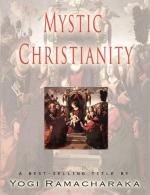“Think not that I came to destroy the law of the prophets: I came not to destroy, but to fulfill. For verily I say unto you, Till heaven and earth pass away, one jot or one tittle shall in no wise pass away from the law till all things be accomplished.” (Matt. 5:17-18.)
In this passage Jesus asserted positively the fact that He was not teaching a new doctrine, but had come simply to carry on the work of those who had preceded Him. He asserted the validity of the Ancient Wisdom, and told that the Law that had been in force would so continue until heaven and earth should pass away—that is, until the end of this great World Cycle. In these words Jesus proclaimed His allegiance to the Occult Teachings. To those who would claim that He referred to the current Jewish teachings we would point out the fact that these he did come to destroy, for Christianity is opposed to the Jewish formalism and outer teachings. Jesus referred to the Inner Teachings, not to the outer religious creeds or forms. He came not to destroy the old Teachings, but merely to “fulfill,” that is, to give a new impetus to the Ancient Wisdom.
“Whoever therefore shall break one of these least commandments, and shall teach men so, shall be called least in the kingdom of heaven: but whosoever shall do and teach them, he shall be called great in the Kingdom of Heaven. For I say unto you, that except your righteousness shall exceed the righteousness of the scribes and Pharisees, ye shall in no wise enter into the kingdom of heaven.” (Matt. 5:19-20.)
Here Jesus cautions against violating the fundamental occult teachings, or of teaching false doctrines. He also again bids men to do and preach the truth. Note the reference to the “kingdom of heaven.” Again He points out that the “righteousness” required to gain the “kingdom of heaven” is a far different thing from the formalism, ceremonialism and “churchism” of the scribes and pharisees—people who, in that day, stood for that which the “churchy” preachers and their bigoted, narrow flock of sheep-like parishioners stand for today. It requires more than “faithful performance of church duties” to enter into the real “kingdom of heaven.” Jesus was ever a foe of the narrow formalism which clings close to the empty forms and words, and which ignores the Spirit. Were He to return today, He would drive from the temples the horde of money-making preachers and hypocritical followers who make a mock of sacred things.




